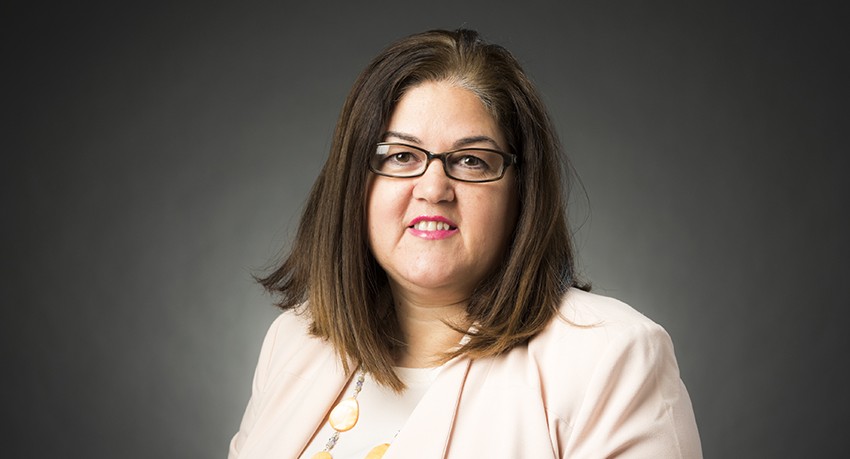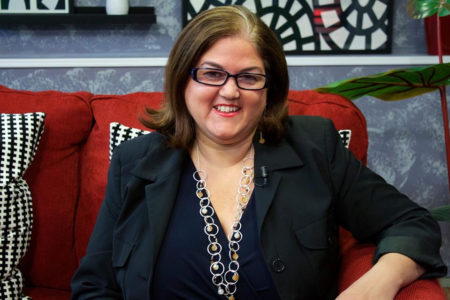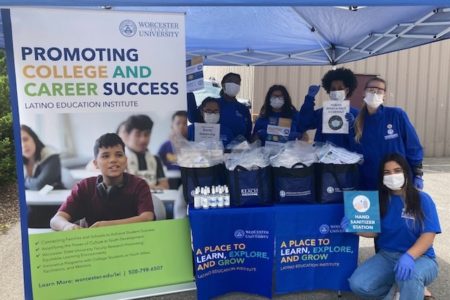
Share On Social!
As a teenager, Hilda Ramirez saw how the educational system did not support Latino students, limiting their chances for academic success and future mental and physical health.
These inequities in education led Ramirez to a career in advocacy for Latinos.
Today, as the executive director of the Latino Education Institute and a representative of the Latino Empowerment and Organizing Network (LEON), she advocates for the well-being of Latino youth in Worcester, Massachusetts (21.9% Latino).
She recently helped create a seven-member commission in Worcester city government organizational to examine the impact of local policy on Latinos.
This work is critical in promoting and encouraging legislation that will benefit the Latino community and address health inequities in education and beyond, according to Ramirez.
“These inequities are so striking; they are so in front of us,” she said. “There are a lot of shifts in the city, too. A group of Latinos got together and focused our energy and we got this done. I think it’s really important. It positions us to not only help with education, but with health and economic development.”
“This accomplishment gives us an eye to look into a lot of things that need to be looked at.”
Beginning a Life in Advocacy from a Young Age
Ramirez was born and raised in New York City (29.1% Latino).
Early on, she experienced a host of different cultures. Her parents urged her to learn about her neighbors and their cultures.
“Growing up in New York City, we were encouraged to question and explore the things around us – to embrace diversity and learn about other cultures,” Ramirez said.
She learned how diversity can improve the lives of people.
She wanted to bring this experience to others. So she started volunteering from a young age. 
Even in high school, Ramirez organized her classmates to form groups to advocate for diversity and beneficial changes for people of color.
“I started to further develop this passion for service when I saw the inequities that exist in our public education systems,” she said. “Coming from that background [of exploring different cultures and serving others] to seeing that our Latino students were not being encouraged to be their best, to strive for their best.”
To begin this path, Ramirez decided to attend college at Lesley University in Massachusetts.
Pivoting from Finance Work to a Career in Advocacy
Ramirez began her career in the private sector, working with John Hancock Financial as a manager.
Still, working with youth was her core passion. During this time, she volunteered as a mentor for local high school students.
She witnessed how school systems were neglecting Latino students.
“It’s in the design of the system that’s making these disparities wider,” she said. “These systems were not designed for Latino students – at all.”
Ramirez said educational inequities come from a host of issues, including a failure on the parts of teachers and administrators to encourage their students of color.
“I would see a repeated message of low expectations coming from educators,” Ramirez said. “After noticing this pattern, I was troubled by that. When I was young, I did face barriers – I couldn’t speak English. I worked really hard and rose to the occasion. Not only did I work hard, but I surpassed many expectations as a student.”
Her mentoring work pushed her toward helping kids in need on full-time basis.
“I decided that’s where my calling was – working with youth,” Ramirez said.
Ramirez decided to go back to school to better realize this dream.
She began a master’s program at Harvard University, eventually graduating with a degree in education.
“I needed the tools to help our youth,” Ramirez said. “That’s why I decided to go to Harvard – I needed the credentials to help our youth. I wanted to be able to speak from lived experience but also the knowledge of how systems work.”
From there, she moved to Worcester to begin her work with youth and education.
After serving in public office as a member of the city’s education committee, Ramirez went to work for advocacy groups. 
She is currently with the Latino Education Institute, part of Worcester State University.
The institute began in 1999 when members of the Worcester Working Coalition for Latino Students decided an institute was needed to see progress for the Latino community when it comes to education.
This university-based institute is “dedicated to illuminating the status of education for Latino students and taking action to improve education outcomes was a core recommended strategy.”
This work propelled her into not only helping youth Latinos and students, but helped the Latino community as a whole toward health equity, where everyone has a fair, just opportunity to be healthy.
The Creation of a Latino-Focused Commission
Cities and school districts shape local policies, programs, and services.
Historically, structural and system racism and discrimination have driven policies that curb access to health-promoting assets — quality housing, transportation, medical care, food, jobs, schools, parks, etc. — for Latinos and other people of color.
Ramirez wanted to address how policy impacts Latinos.
For the past 10 years, Ramirez and her colleagues have worked with city officials to pass Latino-focused legislation for people in Worcester.
The idea was born for a new city commission charged with encouraging, promoting, and monitoring policies in the city that impact Latinos.
“We work with youth and their families, so we’re touching communities,” Ramirez said. “It’s really important work. Especially now with the pandemic. We’re definitely seeing the value in being able to provide [initiatives] with a specific lens to Latinos.”
Worcester City Manager Edward M. Augustus Jr. recently recommended an amendment to the city’s organizational ordinances, which will create the seven-member commission.
Still, the city manager’s proposal to create the commission goes to subcommittee for a public hearing before it comes back to the council for final approval.
Ramirez hopes the commission will improve the lives of Latinos in Worcester.
“Oftentimes, municipalities do not understand the makeup of the Latino community and the fact that we’re very diverse,” Ramirez said. “That we have different needs. That’s why representation is so important. It’s critical to have that representation.”
“Now we have a body that will monitor what is being decided so that there is more equity — that’s huge, that’s important.”
How You Can Step Up for Latinos
Alongside the equity work Ramirez is doing, other groups are finding new ways to fight systemic injustice.
“Everything starts local,” Ramirez said. “Education is regulated by the state and federal government, but at the end of the day, it’s the people who are enacting and are impacted by those policies. Education is a local matter, and you have to be involved, especially our parents.”
This includes making education spaces inclusive and supportive.
In their recent report, America’s Promise Alliance and Research for Action recommend the following steps to help high schoolers:
- Address student mental health, now and on an ongoing basis.
- Teach a comprehensive and accurate history of race and racism in the United States.
- Prioritize postsecondary success through relevant content and pathways planning.
- Saturate young people’s environments with caring adult relationships.
Having more bilingual and culturally relevant mental health resources is also important. These bilingual materials from National Institute of Mental Health (NIMH) can help Latinos learn about mental health treatment.
We can also help children who witness traumatic events, like domestic violence or murder.
These kids still have to go to class or carry on while school is out for summer or due to the pandemic. They face a burden of stress and trauma that can interfere with their behavior and grades—and schools often aren’t even aware there’s an issue.
Download the free Salud America! “Handle With Care Action Pack.”
The Action Pack helps police, school, and mental healthcare leaders start the Handle with Care program, in which police notify schools when they encounter children at a traumatic scene, so schools can provide support right away. They can virtually support kids if school is out for summer or still closed due to COVID-19.
By The Numbers
142
Percent
Expected rise in Latino cancer cases in coming years
This success story was produced by Salud America! with support from the Robert Wood Johnson Foundation.
The stories are intended for educational and informative purposes. References to specific policymakers, individuals, schools, policies, or companies have been included solely to advance these purposes and do not constitute an endorsement, sponsorship, or recommendation. Stories are based on and told by real community members and are the opinions and views of the individuals whose stories are told. Organization and activities described were not supported by Salud America! or the Robert Wood Johnson Foundation and do not necessarily represent the views of Salud America! or the Robert Wood Johnson Foundation.



